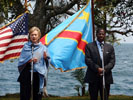
Secretary Clinton’s visit to the Democratic Republic of Congo this week has focused much-needed attention on the impact of the world’s deadliest war on the country’s women and girls. The secretary has done an admirable job sounding the alarm on the scourge of sexual violence that has raged in Congo throughout more than a decade of conflict; her efforts and the ways in which she speaks about this sensitive and emotionally charged issue are neither simplistic nor condescending, and many diplomats and everyday outsiders who follow the conflict in Congo (myself included) would do well to follow her example.
In a front-page story in Tuesday’s Washington Post, timed with Secretary Clinton’s arrival in the Democratic Republic of Congo, correspondent Stephanie McCrummen took a hard look at the massive problem of sexual violence in eastern Congo. Like Secretary Clinton, McCrummen does not mince words in describing the crisis, nor does she attribute it to one single cause. Although the situation in Congo is too complex to boil down into one article, the local perspectives McCrummen features provide a nuanced and realistic, if grim, illustration of the conflict’s underpinnings.
In this chilling quote in the Post article, the Congolese army lieutenant interviewed by McCrummen outlines some of the major factors contributing to this complicated problem from his own perspective:
“The truth is like this," said one officer, sitting under a shed and sipping a powerful local brew. "What is making soldiers to do these bad things is their treatment by the army. Imagine, one can of sardines?! And you send a soldier away for 10 years?! So, I’m hungry, I’m in need of a wife and I have no money" to pay for a prostitute, he said. "If I see a woman walking on the road, and I love her, I will take her. I will help myself."
The lieutenant, who did not give his name, is in charge of teaching his soldiers about human rights. "Now," he said, "buy me a beer so I don’t have to rob you."
I have never been to eastern Congo, and I don’t claim any particular qualifications to unpack or understand the tragedies occurring there on a daily basis. But the quote above made me pause, as did this sentiment from a Congolese woman quoted in the same article:
"According to our custom, even though he’s your husband, when he needs sex, he doesn’t have to ask your permission," she said. "In this territory, men take women like an instrument that doesn’t have any value."
This article is powerful because it gives voice to Congolese people who have raped and been raped, who have been alternately empowered by the violence or exploited, abused, and made to fear for their lives. As disturbing as the testimonies are, it is important to hear directly from some of the perpetrators to begin to understand what motivates their reprehensible actions.
Increased attention is part of the solution. But the killing and the now embedded practice of using rape as a weapon of war won’t end just because outsiders have woken up and noticed what is happening in eastern Congo. As my colleague Laura noted in her post yesterday, Secretary Clinton struck the right tone during her visit to Congo this week, because she spoke frankly about the country’s complex challenges. In particular, she said that there is “no excuse any longer;” the US expects the Congolese government to do more to protect its people and provide them with security and services. At the same time, Clinton emphasized that the US and other countries, as well as the United Nations, are ready to assist the Congolese government in their efforts.
Secretary Clinton’s visit to Congo and some of the media coverage surrounding the visit have done a great deal to not only raise awareness about the conflict in Congo, but to raise the level of discussion of the conflict and its root causes.
Laura Heaton contributed to this post.
Photos: In eastern Congo, Secretary of State Clinton holds a joint press conference with the Congolese foreign minister. Courtesy State.gov

